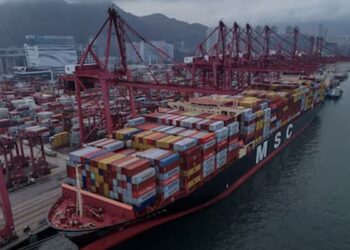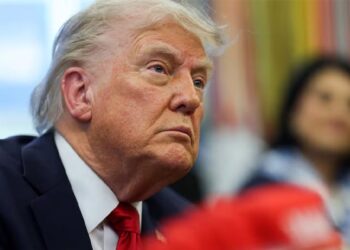WASHINGTON: In light of China’s drastic move to impose a 125% tariff on American goods, President Trump remains steadfast, calling his tariff strategy an advantageous development for both the USA and the global economy, asserting that his approach is “performing extremely well.”
Markets reacted negatively, with investors selling off U.S. government bonds, causing the dollar to slide, and stocks fluctuating as concerns deepened over the already volatile global market situation.
Last week, Trump initially sparked turmoil in financial markets when he proposed extensive import taxes on numerous trade partners, only to scale back those rates to 10 percent on Wednesday for a period of 90 days while increasing tariffs on Chinese imports.
“Our tariff strategy is going remarkably well,” Trump shared in a post on his Truth Social platform following China’s announcement of new tariffs.
“This is incredibly exciting for America and the world!!! Progress is moving swiftly,” he added.
The White House subsequently noted that Trump is still “hopeful” about reaching an agreement with China, and mentioned that 15 other nations have proposals “on the table” during the 90-day hiatus from tariff adjustments.
However, Press Secretary Karoline Leavitt emphasized, “the president has made it clear that when America is struck, he will respond with even greater force.”
The U.S. and China have exchanged a series of increasingly severe tariffs since last week.
Chinese President Xi Jinping made his first significant remarks on the escalating tension on Friday, with state media reporting that he claimed China is “not intimidated.”
Additionally, Xi remarked that the European Union and China should “stand together against unilateral bullying” in discussions with Spanish Prime Minister Pedro Sanchez.
‘Numbers Game’
Following Xi’s comments, Beijing declared that the new 125 percent tariffs on U.S. goods would take effect Saturday—nearly matching the colossal 145 percent tariffs on Chinese goods entering the U.S.
A spokesperson for China’s Commerce Ministry accused the U.S. of bearing full responsibility, dismissing Trump’s tariffs as a “numbers game” that “will become a laughingstock.”
However, a representative from China’s finance ministry acknowledged that tariffs could not be raised further, recognizing that imports at such a high rate are nearly impossible.
Trump reiterated on Thursday that he seeks to negotiate with Xi despite the rising tensions.
“He has been a friend of mine for a long time. I believe we will reach an agreement that benefits both countries,” he told reporters.
Nonetheless, U.S. officials have made it clear they expect Xi to initiate contact first.
Amidst this, there is increasing pressure on Trump as market anxieties persist.
Yields on key U.S. government bonds, typically viewed as a refuge, rose again on Friday, reflecting waning demand as investors expressed their concerns.
The White House, however, stated that they found no evidence supporting traders’ speculations that China might be selling off parts of its substantial holdings as a form of retaliation, which would, in turn, escalate borrowing costs for the U.S. government.
Additionally, U.S. Federal Reserve officials cautioned that higher inflation and slower growth could be on the horizon due to Trump’s tariff measures.
‘Countermeasures’
Economists warn that trade disruptions between the closely connected economies of the U.S. and China could lead to increased consumer prices and potentially ignite a global recession.
Ipek Ozkardeskaya, an analyst at Swissquote Bank, told AFP that the tariff figures have reached heights that “no longer make logical sense,” but she acknowledged that China is “prepared to go as far as necessary.”
The global community is still figuring out its response.
On Thursday, Trump praised the European Union, which was initially subjected to a 20 percent tariff by Trump, for being “very clever” by withholding retaliatory measures.
Top officials from the EU and Chinese leaders are scheduled to hold their next summit to commemorate 50 years of diplomatic relations in China in July, as announced by Brussels. Meanwhile, EU Trade Chief Maros Sefcovic will engage in discussions in Washington on Monday.
However, Ursula von der Leyen, chief of the 27-nation bloc, informed the Financial Times on Friday that the EU has a “broad array of countermeasures” at its disposal, including a potential hit to digital services that could impact American tech companies.






